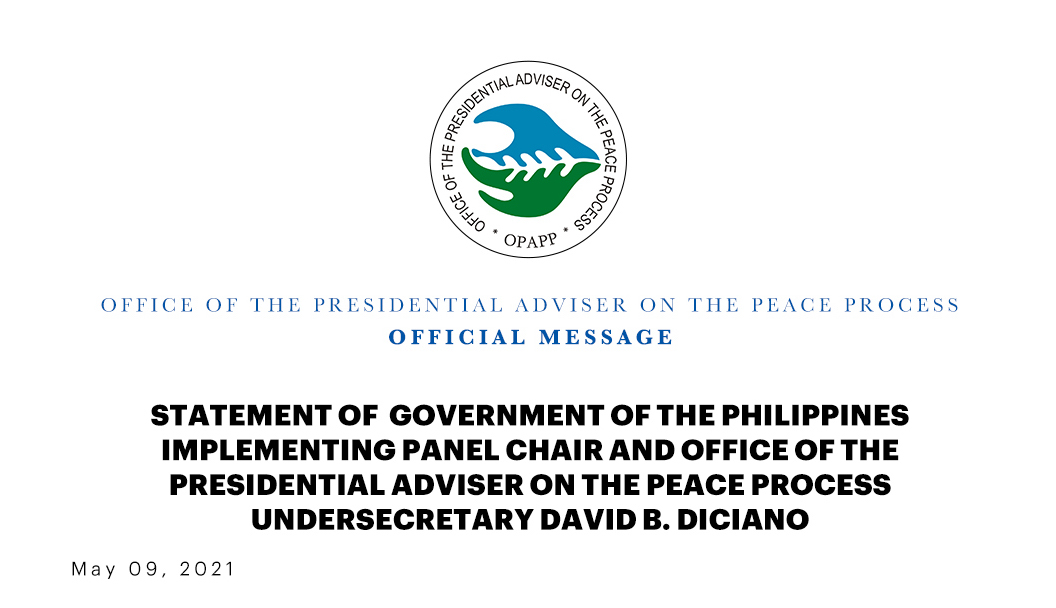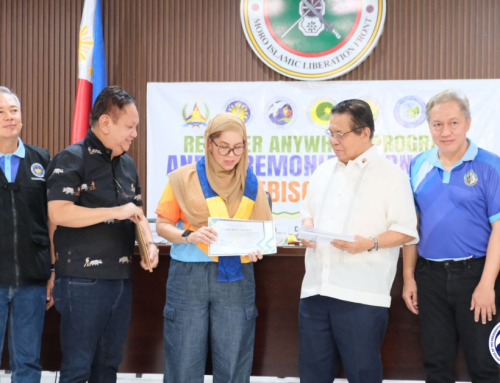This is in response to International Alert Philippines’ press release entitled “Normalization process fails to normalize Mindanao — Alert Philippines” which stated that the normalization process “is in bad shape” and a “complete mess” due to the recent spate of attacks perpetrated by the Bangsamoro Islamic Freedom Fighters (BIFF) in Maguindanao.
First of all, this is a sweeping allegation on the part of IA, as it only takes into account the security aspect of the normalization process. Security is only one of the four components of the normalization track, which also include socio-economic development programs, confidence building measures, and transitional justice and reconciliation.
All of the four components are embodied in the Annex on Normalization of the Comprehensive Agreement on the Bangsamoro (CAB) that are being jointly implemented by Government of the Philippines – Moro Islamic Liberation Front (GPH-MILF) Peace Implementing Panels through its various peace mechanisms on the ground.
For IA’s Francisco Lara Jr to categorically say that “These clashes are the result of the serious flaws and fractures in the normalization agreement that is fueling non-stop violence and conflict in the region” is pure war mongering. Clearly, he fails to take into account the many positive gains that have been achieved since the signing of the CAB.
The passage of the historic GPH-MILF peace pact has not only brought in cross-cutting socio-economic interventions that are uplifting the lives of more than 12,000 decommissioned MILF combatants and their families; it is also helping to heal the wounds of the past and build solidarity among those affected by the decades-long armed conflict.
The decommissioning process is the cornerstone of the normalization track, as it has brought unprecedented peace to communities that were once war zones. These decommissioned combatants have finally turned away from a life of violence, returned to the folds of the law, and are now living as peaceful and productive civilians.
This major turnaround can be gleaned from the reports of the Government of the Philippines – Coordinating Committee on the Cessation of Hostilities (GPH-CCCH) which show that from a high of nearly 700 encounters between the GPH-MILF in 2002, these skirmishes has gone down to zero.
Undoubtedly, this is solid proof that the peace process mechanisms established by the GPH and MILF are working and have been instrumental in preventing situations of conflict.
On the other hand, the creation of the Joint Peace and Security Teams (JPSTs), which is under the security component of the normalization track, aims to further sustain the gains of the peace process. These teams are composed of representatives from the MILF, Armed Forces of the Philippines and Philippine National Police.
These composite peacekeeping teams have in fact been hailed as a novel initiative by international organizations, as it is the first time that former adversaries in the battlefield have come together and are now working shoulder to shoulder to prevent the outbreak of armed conflict in their areas of coverage.
To set the record straight, the JPST’s primary mandate, among others, is to ensure that the ceasefire agreement signed by the government and MILF is upheld by both parties, to help protect and secure communities so that people can live normal lives, and to help initiate possible areas of cooperation to avoid mis-encounters.
In fact, we have received reports that a JPST team assigned in a town in Lanao del Sur has helped to peacefully resolve a “rido” or clan war there. This, we believe, is concrete proof that JPSTs are fulfilling their mission, and that is to prevent the outbreak of conflict and help build bridges of peace among the people.
So, for Mr. Lara to insinuate that “The JPST is a vital tool in preventing violence and not inducing it, which it certainly did in this case” is painting a flawed narrative. Regardless of the establishment of these JPSTs, peace spoilers will always have a reason to launch attacks against the state.
Surely Mr. Lara must know that this is the true nature of these terror groups — to sow violence, fear and divisiveness as a means to promote their twisted ideology. There is simply no justification for the deadly assaults they have carried out which has claimed the lives of innocent civilians and caused the displacement of thousands of residents.
Again, we wish to emphasize that JPSTs are peacekeeping teams. Thus, they should not be used as scapegoats by these terror groups to justify their attacks against communities and the government. The JPST and BIFF are polar opposites. Those who have been closely following the GPH-MILF peace process surely know how to make the distinction.
With Mr. Lara’s statement that “Those implementing it and those enabling its failed processes ought to stop now, take stock, and reverse its disastrous policies and processes or share the blame for its tragic effects,” the government is looking forward to hear his recommendations on how we can further improve our current policies and processes.
At this crucial juncture in the implementation of the normalization track where our nation is also battling the COVID-19 pandemic, making such sweeping generalizations which could fuel animosity among the peace stakeholders themselves and fan the flames of violent extremism should be avoided at all costs. To haphazardly suggest to stop and reverse the implementation of the Normalization Program is akin to asking to halt programs on conflict-resolution and transformation of these conflict-areas towards healing and development. Similar to other peace processes elsewhere in the world, sustaining the peace dividends are often met with challenges including spikes of violence during and after forging peace negotiation. These, however, are the very same reasons to persevere and proceed rather than cease our peace efforts.
As we work towards inclusive peace in the Bangsamoro, built not on patronage but on genuine collaboration, things may indeed get worse before things become better. But with the strong partnership between the Government and MILF, the participation of the BARMM Government, the presence of our normalization mechanisms such as the JPSTs and the support from development partners – indeed, these are indicators that things will get better.
We must keep in mind that the Bangsamoro peace process is complex and multi-dimensional. As such, there are no linear, one-size, fits all solutions to the challenges facing the government and MILF in its implementation. This is why we continue to push the peace process forward, and honor all the commitments we have made under the CAB.
This, we believe, is the only path to achieving just and lasting peace in the Bangsamoro.
END












